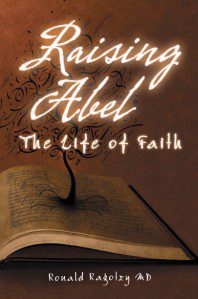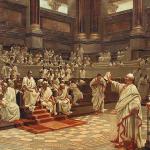 This month in the Patheos Book Club, we’re discussing the new book Raising Abel: The Life of Faith, by Ronald Ragotzy. Here, Dr. Ragotzy shares a bit about his book, and what he hopes readers will take away from it.
This month in the Patheos Book Club, we’re discussing the new book Raising Abel: The Life of Faith, by Ronald Ragotzy. Here, Dr. Ragotzy shares a bit about his book, and what he hopes readers will take away from it.
Q: Why did you write this book? Is there any “back story” that inspired you?
A: I never found a religion that I was comfortable with but I knew they all had common themes. In addition, I have always wanted to know more about faith but could never find a “ faith teacher.” Instead of giving up, I started to read and reread Genesis 1-11 until I found new meaning in the verses, a theme centered around faith. It was extremely energizing to experience this new way of understanding the text, how each new insight connected itself to the whole story of faith. Since I had never read any interpretation similar to the one I was discovering, I felt obligated to write it down.
Q: Who does the book appeal to and why?
A: Anyone who does not feel that faith gives them all the peace, comfort and rest that they will ever need, anyone who suffers.
Q: What one thing do you want readers to learn/take away from this work?
A: Faith is not belief. Faith only comes when we realize that all our human efforts will not give us the peace, comfort and rest that we so desperately long for. We can use Genesis 1-11 as a guide to reinvigorate the faith in us and live life to the fullest having both our wisdom to experience life and the faith to rest in when life gets scary.
Q: Can you give us a specific example, and unforgettable character or life experience that you’ve used in the book that helps deliver your message?
A: I invented a character, Mrs. Serpent, to have a conversation with the Mr. Serpent of Genesis 3. Rather than thinking of the serpent as the devil, which is never implied in Genesis, in Raising Abel, God has given him the task of preventing Adam and Eve from eating the fruit of the tree of the knowledge of good and evil. As we know, the serpent does not prevent Eve from eating the fruit. The conversation between Mr. and Mrs. Serpent after the fact is both funny and insightful.
Q. What is the most controversial aspect of your message or book?
A: I think it might be inviting the reader to see Genesis from a different point of view. I invite them to read Genesis 1-11 as a metaphor for the creation of faith versus the more common practice of one of the creation of physical space. I introduce the idea that all the stories of Genesis 1-11 are linked together to tell us one story about faith.
Q: What themes in your book do you believe are relevant to current news topics, society, the world, or life in general?
A: My book addresses several areas relevant to our society:
- People need to have peace, comfort and rest in their lives and they can’t find it on their own.
- People are looking for social media to connect with each other and think that that will give them peace, comfort and rest.
- Faith and science, right from the beginning, were meant to work together but science was never meant to make us happy.
- Faith is the only thing that can comfort us in the wake of shootings like the one at Newtown.
Q: How is your book different than others out in the market? What needs does your book meet that makes it a “must have” for someone?
A: This book relates “my journey of faith using specific examples from my life which I hope will relate to others. It’s is the only book that I know of that connects the stories of Genesis 1-11 to form a cohesive explanation of faith. It addresses questions like “What faith is?” “How do we lose our faith?” and “When or what does it take to get our faith back?”
Q: What do you want the readers to explore within the pages of your book?
A: I believe I explore the ideas that
- Faith was designed to comfort us, wisdom was designed to allow us to see all the complexities of life.
- We all abandon faith by trying to find our own peace and happiness but often end up in the thorns and thistles.
- These thorns and thistles, however, can help us find faith again.
Q: If you were allowed to only make a few statements about your book’s message what do you want readers to remember?
A: Let’s see. First, Genesis 1-11 lays out our spiritual development. If we read it from a spiritual development perspective, which I guide them through in the book, we can discover where we are along the journey and what we must do to advance in our spiritual growth. Second, faith and human wisdom at the very best work together. Wisdom sees and interacts with all the complexities of the world, both good and evil. Faith lets us rest from our wisdom’s work. The third point would be that we all abandon faith because we think that our wisdom will give us all the rest we need. And finally, the only way to get faith back in our lives is to build our own individual “ark” and, once our faith is found, help others do the same.












